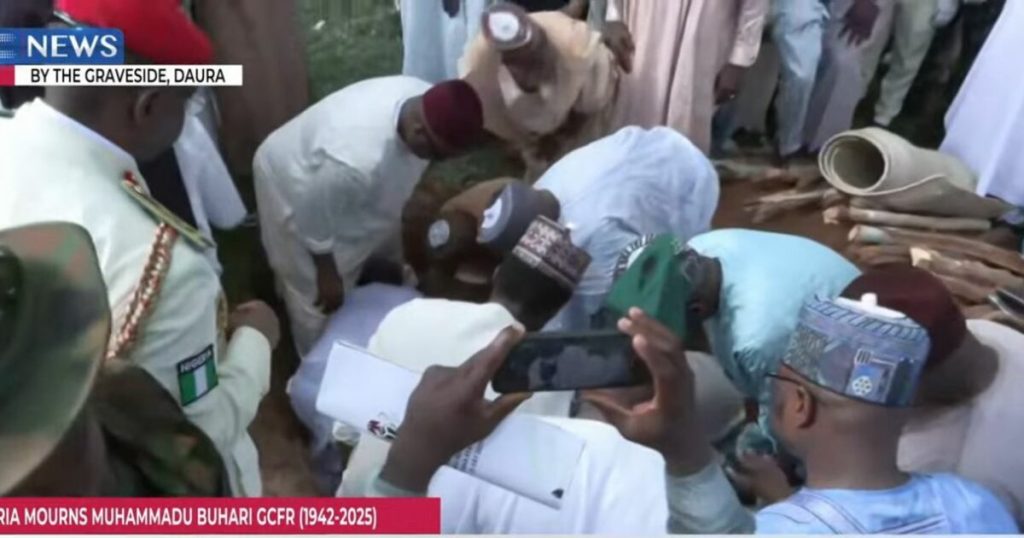The final chapter in the life of former President Muhammadu Buhari was written on Tuesday, July 15, 2025, in Daura, his hometown nestled within Katsina State. A solemn and respectful burial ceremony, conducted in accordance with Islamic traditions, marked the end of a period of national mourning for the leader who had twice held the reins of power in Nigeria, first as a military Head of State and later as a democratically elected president. The air was thick with grief and reverence as dignitaries from across the country and beyond gathered to pay their last respects to the departed statesman. The day was declared a public holiday by the Federal Government, allowing citizens, especially those in the North-West region, to participate in or observe the state burial proceedings.
The journey of Buhari’s remains began in London, where he passed away on Sunday, July 13, 2025, at the age of 82 after battling a prolonged illness. A Nigerian Air Force aircraft, carrying the former President’s body, touched down at the Umaru Musa Yar’Adua International Airport in Katsina on Tuesday. Onboard were Vice President Kashim Shettima and a delegation of high-ranking government officials. President Bola Tinubu, along with several state governors, cabinet members, and past heads of state, were present at the airport to receive the remains. The casket, draped in the vibrant colours of the Nigerian flag, was then transported by helicopter to Daura. The route to his final resting place was lined with thousands of mourners, eager to bid farewell to the leader they revered.
Upon arrival in Daura, the atmosphere was palpably charged with a mixture of deep sorrow and quiet respect. Thousands of residents, kinsmen, and well-wishers had converged on the ancient town since the news of his passing, creating a visible outpouring of grief. Despite the heavy security presence necessary for such a significant event, commercial activities continued, albeit at a subdued pace, as the community prepared to bid farewell to one of their most illustrious sons. The funeral prayers and interment took place at Buhari’s private residence, a more intimate setting reserved for family, close associates, and Islamic clerics.
The final rites commenced with the funeral prayer led by Sheikh Salisu Rabiu, the Imam of the Central Mosque in Daura, at 5:50 pm. Following the prayer, a poignant display of unity and respect unfolded as Army Generals and Service Chiefs carried Buhari’s remains on a stretcher to his graveside. A 21-gun salute, a traditional military honour, reverberated through the air, marking the nation’s final farewell to its former leader. As the earth was gently laid over his final resting place, a collective wave of mourning swept across Nigeria, signifying the end of an era.
The legacy of Muhammadu Buhari resonated deeply within the hearts of many, particularly those in his hometown of Daura. Ismaila Ibrahim, a neighbour of the former President, fondly recalled Buhari’s humility and discipline, traits he maintained throughout his life. Ibrahim’s words, “He was humble and disciplined till the end. For over 50 years, we lived peacefully together here in Daura,” encapsulated the sentiment shared by many who knew him personally. The outpouring of tributes from world leaders and prominent Nigerians further cemented Buhari’s image as a patriot, a man of integrity, and a leader devoted to the service of his nation.
The scene at Buhari’s residence was filled with sorrow as family members and close friends received condolences from the continuous stream of sympathisers. The weight of their loss was evident in their expressions, a testament to the profound impact Buhari had on their lives. As Nigeria mourned the passing of its former leader, his memory was etched into the annals of history, his contributions and legacy destined to be debated and discussed for generations to come. The burial of Muhammadu Buhari marked not only the end of a life but also the close of a significant chapter in Nigeria’s history.


